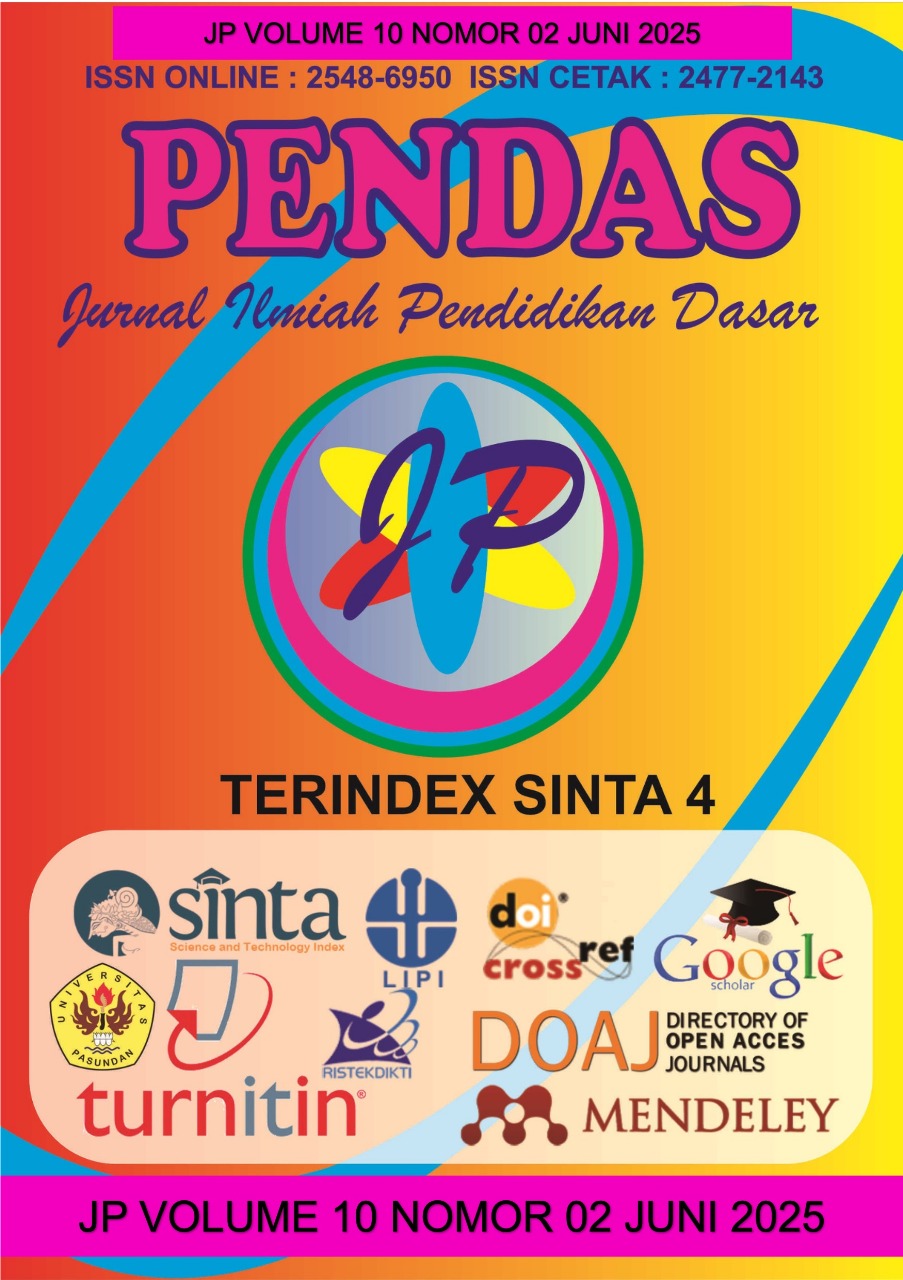KONSEP DAN IMPLEMENTASI PENDEKATAN DEEP LEARNING DI SEKOLAH DASAR
DOI:
https://doi.org/10.23969/jp.v10i2.25562Keywords:
basic education, meaningful learning, deep learningAbstract
This article discusses the integration of the concept of deep learning with the implementation of a learning approach that emphasizes meaningful, mindful, joyful elements in the context of elementary school education. The purpose of this research is to analyze how the concept of deep learning can be effectively implemented at the primary school level. The method used is a qualitative approach based on literature and content analysis from various scientific sources and educational practices. The results of the analysis show that learning that applies a deep learning approach that is joyful, meaningful, and mindful can increase student engagement, strengthen concept understanding, and support cognitive and emotional development. Effective implementation requires the support of teachers who understand modern pedagogical approaches, the availability of adequate technology, and a curriculum that is adaptive to changing times.
Downloads
References
Aryanto, S et al (2025). Pembelajaran Literasi dan Numerasi Melalui Deep Learning: Pendekatan Transformasional di Sekolah Dasar. Journal of Professional Elementary Education. 5 (1), 49-57. https://doi.org/10.46306/jpee.v4i1.101
Azizah, R. N., & Abadi, A. P. (2022). Kajian pustaka: resiliensi dalam pembelajaran matematika. Didactical Mathematics, 4(1), 104-110.
Biggs, J. B., Tang, C. S., & Kennedy, G. (2022). Teaching for quality learning at university(Fifth edition). Open University Press, McGraw Hill.
Diputera, A. M., Zulpan, Eza G. N. (2024). Memahami Konsep Pendekatan Deep Learning dalam Pembelajaran Anak Usia Dini Yang Meaningful dan Joyful: Kajian Melalui Filsafat Pendidikan. Bunga Rampai Usia Emas, 4 (2). 108-120.
Firdaus, K., & Ritonga, M. (2024). Peran Teknologi Dalam Mengatasi Krisis Pendidikan di Daerah Terpencil. Jurnal Kepemimpinan dan Pengurusan Sekolah, 9(1), 43–57. https://doi.org/10.34125/jkps.v9i1.303
Fitriyani, F., & Nugroho, A. T. (2022). Literasi Digital Di Era Pembelajaran Abad 21. Literasi Jurnal Pengabdian Masyarakat Dan Inovasi, 2(1), 307–314. https://doi.org/10.58466/literasi.v2i1.1416
Fullan, M., Quinn, J., & McEachen, J. (2018). Deep learning: Engage the world change the world. Deep Learning: Engage the World Change the World., xvii, 187–xvii, 187
Hafidzhoh, K. A. M., Madani, N. N., Aulia, Z., & Setiabudi, D. (2023). Belajar Bermakna (Meaningful Learning) Pada Pembelajaran Tematik. Student Scientific Creativity Journal, 1(1), 390–397. https://doi.org/10.55606/sscj-amik
.v1i1.1142
Jiang, R. (2022). Understanding, Investigating, and promoting deep learning in language education: A survey on chinese college students’ deep learning in the online EFL teaching context. Frontiers in Psychology. Volume 13. https://doi.org/10.3389/fpsyg.2022.955565
Karthika Devi, M. S., Fathima, S., & Baskaran, R. (2020). CBCS - Comic book cover Synopsis: Generating synopsis of a comic book with unsupervised abstractive dialogue. Procedia Computer Science, 172, 701–708. https://doi.org/10.1016/j.procs.2020.05.100
Kompas, S. A.-. (2024, November 12). ”Deep Learning” Bukan Pengganti Kurikulum Merdeka, Lalu Apa?Kompas.id. https://www.kompas.id/artikel/deep-learning-bukan-pengganti-kurikulum-merdeka-lalu-apa
Muksalmina, M. H. (2023). Bab 4 Kajian Pustaka & Kerangka Teoritis Penelitian Hukum. Metodologi Penelitian Hukum, 37
Nugraha, M. T. (2021). Membentuk Karakter Kepemimpinan Pada Peserta Didik Melalui Pendekatan Pembelajaran Deep Learning. Al-hikmah (Jurnal Pendidikan dan Pendidikan Agama Islam), 3(1), 15-23.
Nur, S. (2019). Pendekatan Joyful Learning Sebagai Metode Pembelajaran Pendidikan Kependudukan & Lingkungan Hidup (PKLH) di Madrasah Ibtidaiyah. Ekspose: Jurnal Penelitian Hukum dan Pendidikan, 16(2), 376-388.
Raup, A., Ridwan, W., Khoeriyah, Y., Supiana, S., & Zaqiah, Q. Y. (2022). Deep Learning dan Penerapannya dalam Pembelajaran. JIIP-Jurnal Ilmiah Ilmu Pendidikan, 5(9), 3258–3267.
Requies, J., Laura Barrio, V., Acha, E., Agirre, I., Viar, N., & Gandarias, I. (2024). Integration of sustainable development goals in the field of process engineering through active learning methodologies. Education for Chemical Engineers, 49, 26–34. https://doi.org/https://doi.org/10.1016/j.ece.2024.08.001
Sari, H. P. (2023). Pengembangan Kurikulum Merdeka Belajar di Sekolah Dasar menurut Aliran filsafat Progresivisme. 6(2).
Suwandi, Putri, R., & Sulastri. (2024). Inovasi Pendidikan dengan Menggunakan Model Deep Learning di Indonesia.Jurnal Pendidikan Kewarganegaraan Dan Politik,2(2), 69-77. https://doi.org/10.61476/186hvh28
Wang, Q., Zhang, Y., Zhang, Y., Chen, T. (2023) The Impact of Mindful Learning on Subjective and Psychological Well-Being in Postgraduate Students. Behav. Sci. 13, 1009. https://doi.org/10.3390/bs13121009
Widyawati, E. R. (2023). Pemanfaatan Media Pembelajaran Berbasis Teknologi sebagai Alat Pembelajaran Kekinian bagi Guru Profesional IPS dalam Penerapan Pendidikan Karakter Menyongsong Era Society 5.0.
Wijaya, A. et al. (2025). Implementasi Pendekatan Deep Learning dalam Peningkatan Kualitas Pembelajaran di SDN 1 Wulung, Randublatung, Blora. Indonesian Research Jurnal on Education. 5 (1) 451-457. https://doi.org/10.31004/irje.v5i1.1950
Downloads
Published
Issue
Section
License
Copyright (c) 2025 Pendas : Jurnal Ilmiah Pendidikan Dasar

This work is licensed under a Creative Commons Attribution 4.0 International License.














































